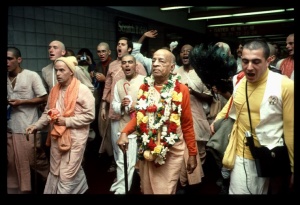SB 7.4.14: Difference between revisions
m (1 revision(s)) |
(Vanibot #0054 edit - transform synonyms into clickable links, which search similar occurrences) |
||
| (One intermediate revision by one other user not shown) | |||
| Line 1: | Line 1: | ||
{{info | {{info | ||
|speaker= | |speaker=Nārada Muni | ||
|listener=King | |listener=King Yudhiṣṭhira | ||
}} | }} | ||
[[Category:Srimad-Bhagavatam - Canto 07 Chapter 04]] | |||
[[Category:Bhagavatam Verses Spoken by Narada Muni - Vanisource|070414]] | |||
<div style="float:left">'''[[Srimad-Bhagavatam]] - [[SB 7|Seventh Canto]] - [[SB 7.4: Hiranyakasipu Terrorizes the Universe|Chapter 4: Hiraṇyakaśipu Terrorizes the Universe]]'''</div> | |||
<div style="float:right">[[File:Go-previous.png|link=SB 7.4.13]] '''[[SB 7.4.13]] - [[SB 7.4.15]]''' [[File:Go-next.png|link=SB 7.4.15]]</div> | |||
{{RandomImage}} | |||
==== TEXT 14 ==== | ==== TEXT 14 ==== | ||
<div | <div class="verse"> | ||
jagur mahendrāsanam ojasā sthitaṁ | :jagur mahendrāsanam ojasā sthitaṁ | ||
viśvāvasus tumburur asmad-ādayaḥ | :viśvāvasus tumburur asmad-ādayaḥ | ||
gandharva-siddhā ṛṣayo 'stuvan muhur | :gandharva-siddhā ṛṣayo 'stuvan muhur | ||
vidyādharāś cāpsarasaś ca pāṇḍava | :vidyādharāś cāpsarasaś ca pāṇḍava | ||
</div> | </div> | ||
| Line 17: | Line 22: | ||
==== SYNONYMS ==== | ==== SYNONYMS ==== | ||
<div | <div class="synonyms"> | ||
''[//vanipedia.org/wiki/Special:VaniSearch?s=jaguḥ&tab=syno_o&ds=1 jaguḥ]'' — sung of the glories; ''[//vanipedia.org/wiki/Special:VaniSearch?s=mahendra&tab=syno_o&ds=1 mahendra]-[//vanipedia.org/wiki/Special:VaniSearch?s=āsanam&tab=syno_o&ds=1 āsanam]'' — the throne of King Indra; ''[//vanipedia.org/wiki/Special:VaniSearch?s=ojasā&tab=syno_o&ds=1 ojasā]'' — by personal power; ''[//vanipedia.org/wiki/Special:VaniSearch?s=sthitam&tab=syno_o&ds=1 sthitam]'' — situated on; ''[//vanipedia.org/wiki/Special:VaniSearch?s=viśvāvasuḥ&tab=syno_o&ds=1 viśvāvasuḥ]'' — the chief singer of the Gandharvas; ''[//vanipedia.org/wiki/Special:VaniSearch?s=tumburuḥ&tab=syno_o&ds=1 tumburuḥ]'' — another Gandharva singer; ''[//vanipedia.org/wiki/Special:VaniSearch?s=asmat&tab=syno_o&ds=1 asmat]-[//vanipedia.org/wiki/Special:VaniSearch?s=ādayaḥ&tab=syno_o&ds=1 ādayaḥ]'' — including ourselves (Nārada and others also glorified Hiraṇyakaśipu); ''[//vanipedia.org/wiki/Special:VaniSearch?s=gandharva&tab=syno_o&ds=1 gandharva]'' — the inhabitants of Gandharva-loka; ''[//vanipedia.org/wiki/Special:VaniSearch?s=siddhāḥ&tab=syno_o&ds=1 siddhāḥ]'' — the inhabitants of Siddhaloka; ''[//vanipedia.org/wiki/Special:VaniSearch?s=ṛṣayaḥ&tab=syno_o&ds=1 ṛṣayaḥ]'' — the great sages and saintly persons; ''[//vanipedia.org/wiki/Special:VaniSearch?s=astuvan&tab=syno_o&ds=1 astuvan]'' — offered prayers; ''[//vanipedia.org/wiki/Special:VaniSearch?s=muhuḥ&tab=syno_o&ds=1 muhuḥ]'' — again and again; ''[//vanipedia.org/wiki/Special:VaniSearch?s=vidyādharāḥ&tab=syno_o&ds=1 vidyādharāḥ]'' — the inhabitants of Vidyādhara-loka; ''[//vanipedia.org/wiki/Special:VaniSearch?s=ca&tab=syno_o&ds=1 ca]'' — and; ''[//vanipedia.org/wiki/Special:VaniSearch?s=apsarasaḥ&tab=syno_o&ds=1 apsarasaḥ]'' — the inhabitants of Apsaroloka; ''[//vanipedia.org/wiki/Special:VaniSearch?s=ca&tab=syno_o&ds=1 ca]'' — and; ''[//vanipedia.org/wiki/Special:VaniSearch?s=pāṇḍava&tab=syno_o&ds=1 pāṇḍava]'' — O descendant of Pāṇḍu. | |||
</div> | </div> | ||
| Line 24: | Line 29: | ||
==== TRANSLATION ==== | ==== TRANSLATION ==== | ||
<div | <div class="translation"> | ||
O Mahārāja Yudhiṣṭhira, descendant of Pāṇḍu, by dint of his personal power, Hiraṇyakaśipu, being situated on the throne of King Indra, controlled the inhabitants of all the other planets. The two Gandharvas Viśvāvasu and Tumburu, I myself and the Vidyādharas, Apsarās and sages all offered prayers to him again and again just to glorify him. | O Mahārāja Yudhiṣṭhira, descendant of Pāṇḍu, by dint of his personal power, Hiraṇyakaśipu, being situated on the throne of King Indra, controlled the inhabitants of all the other planets. The two Gandharvas Viśvāvasu and Tumburu, I myself and the Vidyādharas, Apsarās and sages all offered prayers to him again and again just to glorify him. | ||
</div> | </div> | ||
| Line 31: | Line 36: | ||
==== PURPORT ==== | ==== PURPORT ==== | ||
<div | <div class="purport"> | ||
The asuras sometimes become so powerful that they can engage even Nārada Muni and similar devotees in their service. This does not mean that Nārada was subordinate to Hiraṇyakaśipu. Sometimes, however, it so happens in this material world that great personalities, even great devotees, can also be controlled by the asuras. | The ''asuras'' sometimes become so powerful that they can engage even Nārada Muni and similar devotees in their service. This does not mean that Nārada was subordinate to Hiraṇyakaśipu. Sometimes, however, it so happens in this material world that great personalities, even great devotees, can also be controlled by the ''asuras''. | ||
</div> | </div> | ||
__NOTOC__ | |||
<div style="float:right; clear:both;">[[File:Go-previous.png|link=SB 7.4.13]] '''[[SB 7.4.13]] - [[SB 7.4.15]]''' [[File:Go-next.png|link=SB 7.4.15]]</div> | |||
__NOTOC__ | |||
__NOEDITSECTION__ | |||
Latest revision as of 23:01, 18 February 2024

A.C. Bhaktivedanta Swami Prabhupada
TEXT 14
- jagur mahendrāsanam ojasā sthitaṁ
- viśvāvasus tumburur asmad-ādayaḥ
- gandharva-siddhā ṛṣayo 'stuvan muhur
- vidyādharāś cāpsarasaś ca pāṇḍava
SYNONYMS
jaguḥ — sung of the glories; mahendra-āsanam — the throne of King Indra; ojasā — by personal power; sthitam — situated on; viśvāvasuḥ — the chief singer of the Gandharvas; tumburuḥ — another Gandharva singer; asmat-ādayaḥ — including ourselves (Nārada and others also glorified Hiraṇyakaśipu); gandharva — the inhabitants of Gandharva-loka; siddhāḥ — the inhabitants of Siddhaloka; ṛṣayaḥ — the great sages and saintly persons; astuvan — offered prayers; muhuḥ — again and again; vidyādharāḥ — the inhabitants of Vidyādhara-loka; ca — and; apsarasaḥ — the inhabitants of Apsaroloka; ca — and; pāṇḍava — O descendant of Pāṇḍu.
TRANSLATION
O Mahārāja Yudhiṣṭhira, descendant of Pāṇḍu, by dint of his personal power, Hiraṇyakaśipu, being situated on the throne of King Indra, controlled the inhabitants of all the other planets. The two Gandharvas Viśvāvasu and Tumburu, I myself and the Vidyādharas, Apsarās and sages all offered prayers to him again and again just to glorify him.
PURPORT
The asuras sometimes become so powerful that they can engage even Nārada Muni and similar devotees in their service. This does not mean that Nārada was subordinate to Hiraṇyakaśipu. Sometimes, however, it so happens in this material world that great personalities, even great devotees, can also be controlled by the asuras.